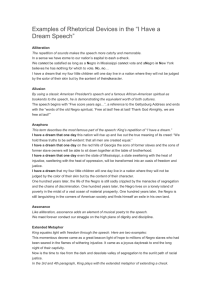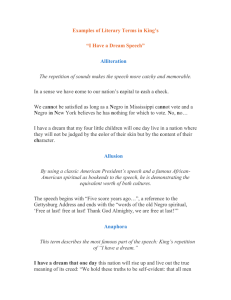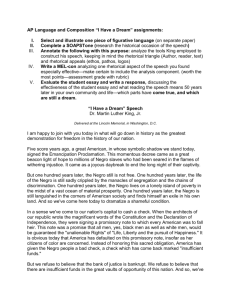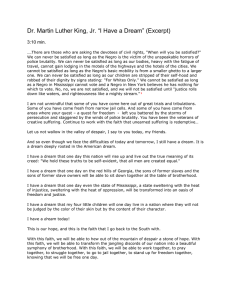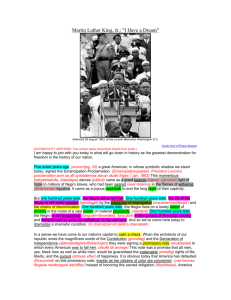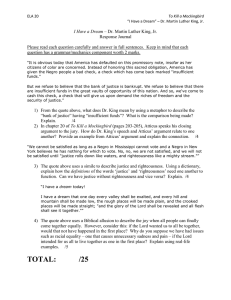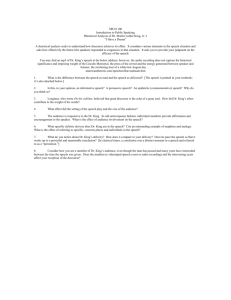question and write it in your answer sheet.
advertisement
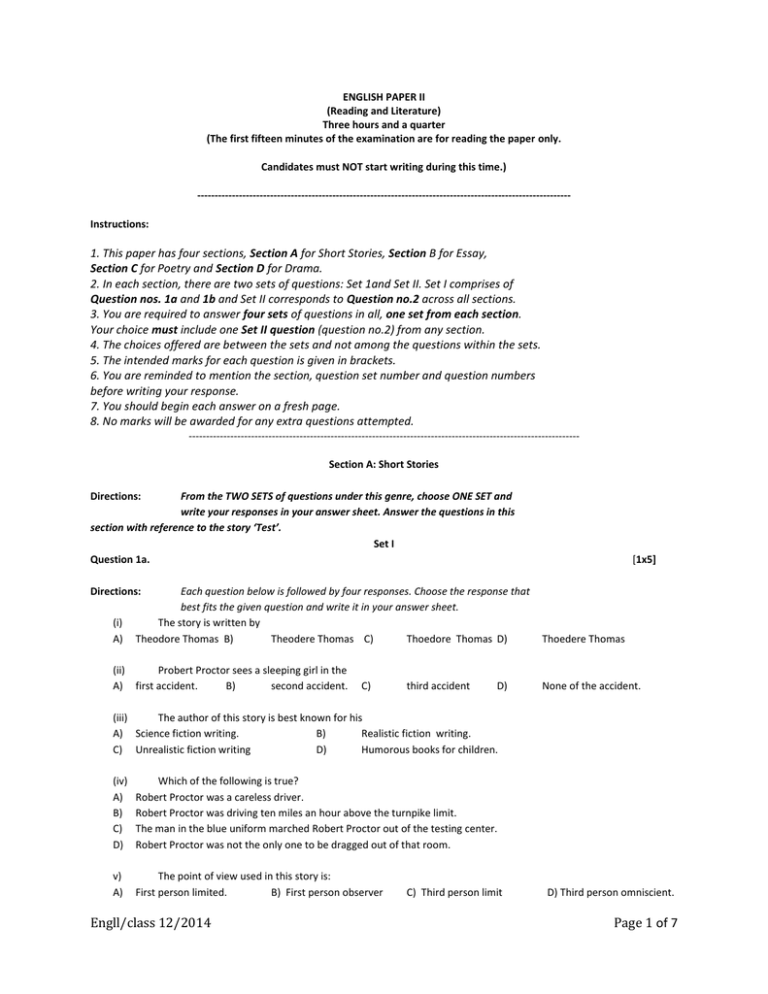
ENGLISH PAPER II (Reading and Literature) Three hours and a quarter (The first fifteen minutes of the examination are for reading the paper only. Candidates must NOT start writing during this time.) -----------------------------------------------------------------------------------------------------------Instructions: 1. This paper has four sections, Section A for Short Stories, Section B for Essay, Section C for Poetry and Section D for Drama. 2. In each section, there are two sets of questions: Set 1and Set II. Set I comprises of Question nos. 1a and 1b and Set II corresponds to Question no.2 across all sections. 3. You are required to answer four sets of questions in all, one set from each section. Your choice must include one Set II question (question no.2) from any section. 4. The choices offered are between the sets and not among the questions within the sets. 5. The intended marks for each question is given in brackets. 6. You are reminded to mention the section, question set number and question numbers before writing your response. 7. You should begin each answer on a fresh page. 8. No marks will be awarded for any extra questions attempted. ----------------------------------------------------------------------------------------------------------------Section A: Short Stories Directions: From the TWO SETS of questions under this genre, choose ONE SET and write your responses in your answer sheet. Answer the questions in this section with reference to the story ‘Test’. Set I Question 1a. Directions: (i) A) Each question below is followed by four responses. Choose the response that best fits the given question and write it in your answer sheet. The story is written by Theodore Thomas B) Theodere Thomas C) Thoedore Thomas D) [1x5] (ii) Probert Proctor sees a sleeping girl in the A) first accident. B) second accident. C) third accident D) Thoedere Thomas None of the accident. (iii) The author of this story is best known for his A) Science fiction writing. B) Realistic fiction writing. C) Unrealistic fiction writing D) Humorous books for children. (iv) A) B) C) D) Which of the following is true? Robert Proctor was a careless driver. Robert Proctor was driving ten miles an hour above the turnpike limit. The man in the blue uniform marched Robert Proctor out of the testing center. Robert Proctor was not the only one to be dragged out of that room. v) A) The point of view used in this story is: First person limited. B) First person observer Engll/class 12/2014 C) Third person limit D) Third person omniscient. Page 1 of 7 Question 1b. Directions: (i) (ii) (iii) (iv) [20] Read the following questions carefully. Copy the number of the questions onto your answer sheets and answer them briefly. Provide a detailed character analysis of Robert Proctor. If you were in the place of the protagonist, how would you react? What do the ‘two grooves worn in the floor’ in the last sentence of the story suggest? Explain the main conflict in the story. Set II (5) (5) (5) (5) Question 2. [25] Directions: Read the following questions carefully. Copy the number of the questions onto your answer sheets and answer them accordingly. (i) What were the explanations given by the man in blue uniform for Robert Proctor failing the driving test? Is the test ethical? Why? (10) Give an explanation of the narrative technique used in this story? (15) (ii) Section B: Essay Directions: Read the essay given below carefully. From the TWO SETS of questions on this text, choose ONE SET and write your responses in your answer sheet. Martin Luther King, Jr. I Have a Dream delivered 28 August 1963, at the Lincoln Memorial, Washington D.C. I am happy to join with you today in what will go down in history as the greatest demonstration for freedom in the history of our nation. Five score years ago, a great American, in whose symbolic shadow we stand today, signed the Emancipation Proclamation. This momentous decree came as a great beacon light of hope to millions of Negro slaves who had been seared in the flames of withering injustice. It came as a joyous daybreak to end the long night of their captivity. But one hundred years later, the Negro still is not free. One hundred years later, the life of the Negro is still sadly crippled by the manacles of segregation and the chains of discrimination. One hundred years later, the Negro lives on a lonely island of poverty in the midst of a vast ocean of material prosperity. One hundred years later, the Negro is still languished in the corners of American society and finds himself an exile in his own land. And so we've come here today to dramatize a shameful condition. In a sense we've come to our nation's capital to cash a check. When the architects of our republic wrote the magnificent words of the Constitution and the Declaration of Independence, they were signing a promissory note to which every American was to fall heir. This note was a promise that all men, yes, black men as well as white men, would be guaranteed the "unalienable Rights" of "Life, Liberty and the pursuit of Happiness." It is obvious today that America has defaulted on this promissory note, insofar as her citizens of color are concerned. Instead of honoring this sacred obligation, America has given the Negro people a bad check, a check which has come back marked "insufficient funds." But we refuse to believe that the bank of justice is bankrupt. We refuse to believe that there are insufficient funds in the great vaults of opportunity of this nation. And so, we've come to cash this check, a check that will give us upon demand the riches of freedom and the security of justice. We have also come to this hallowed spot to remind America of the fierce urgency of Now. This is no time to engage in the luxury of cooling off or to take the tranquilizing drug of gradualism. Now is the time to make real the promises of democracy. Engll/class 12/2014 Page 2 of 7 Now is the time to rise from the dark and desolate valley of segregation to the sunlit path of racial justice. Now is the time to lift our nation from the quicksands of racial injustice to the solid rock of brotherhood. Now is the time to make justice a reality for all of God's children. It would be fatal for the nation to overlook the urgency of the moment. This sweltering summer of the Negro's legitimate discontent will not pass until there is an invigorating autumn of freedom and equality. Nineteen sixty-three is not an end, but a beginning. And those who hope that the Negro needed to blow off steam and will now be content will have a rude awakening if the nation returns to business as usual. And there will be neither rest nor tranquility in America until the Negro is granted his citizenship rights. The whirlwinds of revolt will continue to shake the foundations of our nation until the bright day of justice emerges. But there is something that I must say to my people, who stand on the warm threshold which leads into the palace of justice: In the process of gaining our rightful place, we must not be guilty of wrongful deeds. Let us not seek to satisfy our thirst for freedom by drinking from the cup of bitterness and hatred. We must forever conduct our struggle on the high plane of dignity and discipline. We must not allow our creative protest to degenerate into physical violence. Again and again, we must rise to the majestic heights of meeting physical force with soul force. The marvelous new militancy which has engulfed the Negro community must not lead us to a distrust of all white people, for many of our white brothers, as evidenced by their presence here today, have come to realize that their destiny is tied up with our destiny. And they have come to realize that their freedom is inextricably bound to our freedom. We cannot walk alone.And as we walk, we must make the pledge that we shall always march ahead.We cannot turn back. There are those who are asking the devotees of civil rights, "When will you be satisfied?" We can never be satisfied as long as the Negro is the victim of the unspeakable horrors of police brutality. We can never be satisfied as long as our bodies, heavy with the fatigue of travel, cannot gain lodging in the motels of the highways and the hotels of the cities. We cannot be satisfied as long as the negro's basic mobility is from a smaller ghetto to a larger one. We can never be satisfied as long as our children are stripped of their self-hood and robbed of their dignity by signs stating: "For Whites Only." We cannot be satisfied as long as a Negro in Mississippi cannot vote and a Negro in New York believes he has nothing for which to vote. No, no, we are not satisfied, and we will not be satisfied until "justice rolls down like waters, and righteousness like a mighty stream." I am not unmindful that some of you have come here out of great trials and tribulations. Some of you have come fresh from narrow jail cells. And some of you have come from areas where your quest -- quest for freedom left you battered by the storms of persecution and staggered by the winds of police brutality. You have been the veterans of creative suffering. Continue to work with the faith that unearned suffering is redemptive. Go back to Mississippi, go back to Alabama, go back to South Carolina, go back to Georgia, go back to Louisiana, go back to the slums and ghettos of our northern cities, knowing that somehow this situation can and will be changed. Let us not wallow in the valley of despair, I say to you today, my friends. And so even though we face the difficulties of today and tomorrow, I still have a dream. It is a dream deeply rooted in the American dream. I have a dream that one day this nation will rise up and live out the true meaning of its creed: "We hold these truths to be selfevident, that all men are created equal." I have a dream that one day on the red hills of Georgia, the sons of former slaves and the sons of former slave owners will be able to sit down together at the table of brotherhood. I have a dream that one day even the state of Mississippi, a state sweltering with the heat of injustice, sweltering with the heat of oppression, will be transformed into an oasis of freedom and justice. I have a dream that my four little children will one day live in a nation where they will not be judged by the color of their skin but by the content of their character. I have a dream today! I have a dream that one day, down in Alabama, with its vicious racists, with its governor having his lips dripping with the words of "interposition" and "nullification" -- one day right there in Alabama little black boys and black girls will be able to join hands with little white boys and white girls as sisters and brothers. I have a dream today! I have a dream that one day every valley shall be exalted, and every hill and mountain shall be made low, the rough places will be made plain, and the crooked places will be made straight; "and the glory of the Lord shall be revealed and all flesh shall see it together." Engll/class 12/2014 Page 3 of 7 This is our hope, and this is the faith that I go back to the South with. With this faith, we will be able to hew out of the mountain of despair a stone of hope. With this faith, we will be able to transform the jangling discords of our nation into a beautiful symphony of brotherhood. With this faith, we will be able to work together, to pray together, to struggle together, to go to jail together, to stand up for freedom together, knowing that we will be free one day. And this will be the day -- this will be the day when all of God's children will be able to sing with new meaning: My country 'tis of thee, sweet land of liberty, of thee I sing. Land where my fathers died, land of the Pilgrim's pride, From every mountainside, let freedom ring! And if America is to be a great nation, this must become true. And so let freedom ring from the prodigious hilltops of New Hampshire. Let freedom ring from the mighty mountains of New York. Let freedom ring from the heightening Alleghenies of Pennsylvania. Let freedom ring from the snow-capped Rockies of Colorado. Let freedom ring from the curvaceous slopes of California. But not only that: Let freedom ring from Stone Mountain of Georgia. Let freedom ring from Lookout Mountain of Tennessee. Let freedom ring from every hill and molehill of Mississippi. From every mountainside, let freedom ring. And when this happens, and when we allow freedom ring, when we let it ring from every village and every hamlet, from every state and every city, we will be able to speed up that day when all of God's children, black men and white men, Jews and Gentiles, Protestants and Catholics, will be able to join hands and sing in the words of the old Negro spiritual: Free at last! Free at last! Thank God Almighty, we are free at last! Set I Question 1a. Directions: (i) A) (ii) A) [1x5] Each question below is followed by four responses. Choose the response that best fits the given question and write it in your answer sheet. Five score years mean Five solid years. B) Five hundred years. C) Fifty years. The figure of speech used in this line “This momentous decree came as a great beacon light of hope to millions of Negro slaves who had been seared in the flames of withering injustice. It came as a joyous daybreak to end the long night of their captivity” is Simile. B) Metaphor. C) Hyperbole. D) Personification. (iii) The speech ends with a note of A) Anger. B) Hope. C) iv) A) C) Which one is not true? This situation can be changed. They are free at last. B) D) v) A) His speech is full of Reminder. B) Euphemism. Hopelessness. D) Freedom Negro is granted his citizenship rights. The speaker is very hopeful. C) Repetition. D) Question1b. Directions: (i) D) One hundred years. Hyperbole [20] Read the following questions carefully. Copy the number of the questions onto your answer sheets and answer them briefly. Did the emancipation proclamation apply to everybody? Why? Engll/class 12/2014 (5) Page 4 of 7 (ii) (iii) (iv) what does the speaker mean when he says, “In the process of gaining our rightful place, we must not be guilty of wrongful deeds” in the eighth paragraph? (5) Why have they come to cash a check that will give them upon demand the riches of freedom and the security of justice? (5) How effective can such a speech be in changing the people’s mind? Justify. (5) Set II Question 2. [25] Directions: Read the following questions carefully. Copy the number of the questions onto your answer sheets and answer them accordingly. (i) Elaborate in your own words the dreams of the speaker. Also mention which one is the most beautiful dream to you and why? (15 marks) (ii) According to the speaker regarding the civil rights, when will they ever be satisfied? (10 marks) Section C: Poetry Directions: After reading the poem, choose ONE SET from the given sets under this genre, and write your responses in your answer sheet. The Wild Swans at Coole - W.B. Yeats The trees are in their autumn beauty, The woodland paths are dry, Under the October twilight the water Mirrors a still sky; Upon the brimming water among the stones Are nine-and-fifty swans. The nineteenth autumn has come over me Since I first made my count; I saw, before I had well finished, All suddenly mount And scatter wheeling in great broken rings Upon their clamorous wings. I have looked upon those brilliant creatures, And now my heart is sore. All’s changed since I, hearing at twilight, The first on this shore, The bell-beat of their wings above my head, Trod with a lighter tread. Unwearied still, lover by lover, They paddle in the cold Companionable streams or climb the air; Their hearts have not grown old; Passion or conquest, wander where they will, Attend upon them still. But now they drift on the still water, Mysterious, beautiful; Among what rushes will they build, By what lake’s edge or pool Delight men’s eyes when I awake some day To find they have flown away? Engll/class 12/2014 Page 5 of 7 SET -I Question 1 a Direction: Each question below is followed by four responses. Choose the answer or response that best fits the question and write your answer. [5x1] (i) The speaker in the poem is a person who A enjoys nature.B enjoys watching wild swans. C enjoys walking by the lake.D enjoys the autumn season. (ii) The poem is most like a/an A Ode.B Sonnet.C Lyric.D (iii) (iv) Dramatic monologue. The speaker A returns to the lake for the nineteenth time. B C wants to wake up to find the swans gone.D never wants to return to the place. rows a boat in the lake. The setting of the poem is A lake. a beach and the sea. B the sea. C D a forest. (v) ‘They’ in the fourth stanza refers to A the people who watch the swans. B he lake and the stream. C the swans. D the wings. Question 1b Read the following questions carefully and answer them briefly. (i) Describe the setting of the poem in the first stanza. (ii) Why does the speaker say his heart is sore? (iii) What does the speaker hope in the final stanza? (iv) Why do you think the speaker says, “Their hearts have not grown old”? [4x5] (5) (5) (5) (5) Set – II Question 2 Read the following questions and answer them in detail. (i) Paraphrase the poem in your own words. (ii) What do you think is the theme? Justify with evidences from the poem. (25) [15] [10] Section D: Drama Directions:From the two sets of questions under this genre, choose ONE SET and write your responses in your answer sheet. SET I Question 1a [1x5 marks] Directions:Each question below is followed by four responses. Choose the correct answer or response that best fits the given question and write it in your answer sheet. (i) Of all the characters the _______ is the only character who is calm at the end of the drama. A housing inspector B mother C friend D maid (ii) The author’s friend, who is a scriptwriter, wants the author to A agree with the ending that he has written in his script. B talk to the difficult actor. C co-write the ending of the film with him. D help him find a proper ending for his film. Engll/class 12/2014 Page 6 of 7 (ii) Which character wants boots? A La Surette C Gontran (iv) B D Friend Mother Which character lies to the Author about losing a lawsuit? A Mother B Ardele C La SuretteD (v) Friend One of the ironies in the play is A Ardele cheats on her husband. B La Surette had helped the Author once. C the Author yells at the people to keep calm. D an unknown woman constantly calls the Author. Question 1b. Directions: (i) (ii) (iii) (iv) [20 marks] Read the following questions carefully. Copy the number of the questions onto your answer sheets and answer them briefly. Give two reasons and explain why the Housing Inspector gets angry with the Author? Explain what is ironic about Gontran’s sadness? How does the Author try to control the excitement of the people? What is the irony in it? What does the ‘falling picture’ symbolize in the drama? Explain. Set II Question 2. Directions: Read the following questions carefully. Copy the number of the questions onto your answer sheets and answer them accordingly. (5) (5) (5) (5) [25] (i) ‘Things going out of control’ is a feature of farce. Justify how the writer in the drama explores this feature towards the end of the drama. (10) (ii) The Theater of Absurd is known for its mistrust of language. Identify and explain how three scenes in the drama employ this primary feature. (15) ********All The Best******** Engll/class 12/2014 Page 7 of 7
